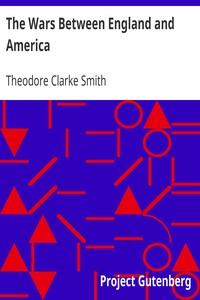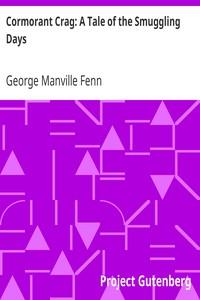|
|
Read this ebook for free! No credit card needed, absolutely nothing to pay.Words: 57201 in 9 pages
This is an ebook sharing website. You can read the uploaded ebooks for free here. No credit cards needed, nothing to pay. If you want to own a digital copy of the ebook, or want to read offline with your favorite ebook-reader, then you can choose to buy and download the ebook.

: The Wars Between England and America by Smith Theodore Clarke - United States Politics and government; United States History Revolution 1775-1783; United States History War of 1812 United Kingdom@FreeBooksTue 06 Jun, 2023 CHAP. PAGE THE WARS BETWEEN ENGLAND AND AMERICA THE ELEMENTS OF ANTAGONISM, 1763 In 1763, by the Peace of Paris, England won a position of unapproached supremacy in colonial possessions and in naval strength. The entire North American continent east of the Mississippi River was now under the British flag, and four West India sugar islands were added to those already in English hands. In India, the rivalry of the French was definitely crushed and the control of the revenues and fortunes of the native potentates was transferred to the East India Company. Guided by the genius of Pitt, British armies had beaten French in Germany and America, and British fleets had conquered French and Spanish with complete ease. The power of the Empire seemed beyond challenge. Yet within this Empire itself there lay already the seeds of a discord which was soon to develop into an irrepressible contest, leading to civil war; then, for a generation, to drive the separated parts into renewed antagonism, and finally to cause a second war. Between the North American colonies and the mother country there existed such moral, political, and economic divergence that nothing but prudent and patient statesmanship on both sides of the Atlantic could prevent disaster. The fundamental source of antagonism lay in the fact that the thirteen colonies had developed a wholly different social and political life from that of the mother country. Originally, the prevailing ideas and habits of the colonists and of the Englishmen who remained at home had been substantially the same. In England, as in America, the gentry and middle classes played a leading part during the years from 1600 to 1660. But by 1763 England, under the Hanoverian kings, had become a state where all political and social power had been gathered into the hands of a landed aristocracy which dominated the government, the Church, and the professions. In parliament, the House of Commons--once the body which reflected the conscious strength of the gentry and citizens,--had now fallen under the control of the peers, owing to the decayed condition of scores of ancient parliamentary boroughs. Nearly one-third of the seats were actually or substantially owned by noblemen, and of the remainder a majority were venal, the close corporations of Mayor and Aldermen selling freely their right to return two members at each parliamentary election. In addition, the influence and prestige of the great landowners were so powerful that even in the counties, and in those boroughs where the number of electors was considerable, none but members of the ruling class sought election. So far as the members of the middle class were concerned--the merchants, master weavers, iron producers, and craftsmen,--they were strong in wealth and their wishes counted heavily with the aristocracy in all legislation of a financial or commercial nature; but of actual part in the government they had none. As for the lower classes,--the labourers, tenant farmers, and shopkeepers,--they were able as a rule to influence government only by rioting and uproar. Without the ballot, they had no other way. This system, moreover, rested in 1763 on the aquiescence of practically all Englishmen. It was accepted by middle and lower classes alike as normal and admirable; and only a small body of radicals felt called upon to criticize the exclusion of the mass of taxpayers from a share in the government. Pitt, in Parliament, was ready to proclaim a national will as something distinct from the voice of the borough-owners, but he had few followers. Only in London and a few counties did sundry advocates of parliamentary reform strive in the years after 1763 to emphasize these views by organizing the freemen to petition and to "instruct" their representatives in the Commons. Such desires evoked nothing but contempt and antipathy in the great majority of Englishmen. Especially when they became audible in the mouths of rioters did they appear revolutionary and obnoxious to the lovers of peace, good order, and the undisturbed collection of rents and taxes. Nothing but a genuine social revolution could bring such ideas to victory and that, in 1763, lay very far in the future. For the time conservatism reigned supreme. In the thirteen colonies, on the other hand, the communities of middle-class Englishmen who emigrated in the seventeenth century had developed nothing resembling a real aristocracy. Social distinctions, modelled on those of the old country, remained between the men of large wealth--such as the great landed proprietors in New York and the planters in the South, or the successful merchants in New England and the Middle colonies--and the small farmers, shopkeepers, and fishermen, who formed the bulk of the population; while all of these joined in regarding the outlying frontiersmen as elements of society deserving of small consideration. Men of property, education, and "position" exercised a distinct leadership in public and private life. Yet all this remained purely social; in law no such thing as an aristocracy could be found, and in government the colonies had grown to be very nearly republican. Here lay the fundamental distinction between the England and the America of 1763. In America, a title or peerage conferred no political rights whatever; these were founded in every case on law, on a royal charter or a royal commission which established a frame of government, and were based on moderate property qualifications which admitted a majority of adult males to the suffrage and to office. In every colony the government consisted of a governor, a council, and an assembly representing the freemen. This body, by charter, or royal instructions, had the full right to impose taxes and vote laws; and, although its acts were liable to veto by the governor, or by the Crown through the Privy Council, it possessed the actual control of political power. This it derived immediately from its constituents and not from any patrons, lords, or close corporations. Representation and the popular will were, in fact, indissolubly united. The governor in two colonies, Connecticut and Rhode Island, was chosen by the freemen. Elsewhere, he was appointed by an outside authority: in Pennsylvania, Delaware, and Maryland by the hereditary proprietor to whom the charter had been granted, in all other colonies by the Crown. The councillors, who commonly exercised judicial functions in addition to their duties as the governor's advisers and as the upper house of the legislature, were appointed in all colonies except the three in New England; and they were chosen in all cases from among the socially prominent colonists. The judges, also, were appointed by the governor; and they, with governor and council, were supposed to represent the home government in the colonies. But in reality there was no effective imperial control. The Crown, it is true, appeared to have large powers. It granted charters, established provinces by commissions, exercised the right to annul laws and hear appeals from colonial decisions, exacted reports from governors, sent instructions, and made appointments and removals at will. But nearly all the colonial officials, except the few customs officers, were paid out of colonial appropriations, and this one fact sufficed to deprive them of any independent position. In nearly every colony, the assembly, in the course of two-thirds of a century of incessant petty conflict, of incessant wrangling and bargaining, of incessant encroachments on the nominal legal powers of the governor, had made itself master of the administration. The colonists resisted all attempts to direct their military or civil policy, laid only such taxes as they chose, raised only such troops as they saw fit, passed only such laws as seemed to them desirable, and tied the governor's hands by every sort of device. They usurped the appointment of the colonial treasurer, they appointed committees to oversee the expenditure of sums voted, they systematically withheld a salary from the governor, in order to render him dependent upon annual "presents," liable to diminution or termination in case he did not satisfy the assembly's wishes. The history of the years from 1689 to 1763 is a chronicle of continual defeat for governors who were obliged to see one power after another wrenched away from them. Under the circumstances, the political life of the thirteen colonies was practically republican in character, and was as marked for its absence of administrative machinery as the home government was for its aristocracy and centralization. Another feature of colonial life tended to accentuate this difference. Although religion had ceased to be a political question, and the English Church was no longer regarded, save in New England, as dangerous to liberty, the fact that the great majority of the colonists were dissenters--Congregational, Presbyterian, or Reformed, with a considerable scattering of Baptists and other sects--had an effect on the attitude of the people toward England. In the home country, the controlling social classes accepted the established church as part of the constitution; but in the colonies it had small strength, and even where it was by law established it remained little more than an official body, the "Governor's church." This tended to widen the gap between the political views of the individualistic dissenting and Puritan sects in the colonies and the people at home. The American of 1763 was thus a different kind of man from the Englishman. As a result of the divergent development on the two sides of the Atlantic from a common ancestry, their political habits had become mutually incomprehensible. To the Englishman, the rule of the nobility was normal--the ideal political system. He was content, if a commoner, with the place assigned to him. To the colonist, on the other hand, government in which the majority of adult male inhabitants possessed the chief power was the only valid form,--all others were vicious. Patriotism meant two contradictory things. The Englishman's patriotism was sturdy but unenthusiastic, and showed itself almost as much in a contempt for foreigners as in complacency over English institutions. The colonist, on the contrary, had a double allegiance: one conventional and traditional, to the British crown; the other a new, intensely local and narrow attachment to his province. England was still the "old home," looked to as the source of political authority, of manners and literature. It was for many of the residents their recent abode and, for all except a few of Dutch, German, or French extraction, their ancestral country. But already this "loyalty" on the part of the colonists was dwindling into something more sentimental than real. The genuine local patriotism of the colonists was shown by their persistent struggle against the representatives of English authority in the governors' chairs. There had developed in America a new sort of man, an "American," who wished to be as independent of government as possible, and who, while professing and no doubt feeling a general loyalty to England, was in fact a patriot of his own colony. Free books android app tbrJar TBR JAR Read Free books online gutenberg More posts by @FreeBooks
: The Goat and Her Kid by Myrtle Harriet - Birds Juvenile fiction; Goats Juvenile fiction; Winter sports Juvenile fiction Children's Fiction@FreeBooksTue 06 Jun, 2023

: The American Cyclops the Hero of New Orleans and Spoiler of Silver Spoons by McLaughlin James Fairfax - Butler Benjamin F. (Benjamin Franklin) 1818-1893 Poetry; New Orleans (La.) History Capture 1862 Poetry; United States History Civil War 1861-1865 Poetry@FreeBooksTue 06 Jun, 2023
|
Terms of Use Stock Market News! © gutenberg.org.in2025 All Rights reserved.






